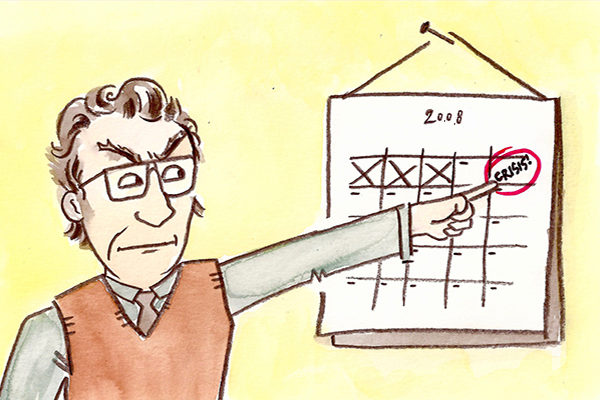By Breshay Moore.
This year marks the 10th anniversary of the 2008 financial crisis. Although the crisis is remembered for foreclosures, bank failures and bailouts, many American citizens are still unaware of what caused it. Understanding this is important to prevent future crises and think about what kind of financial system we want to have: one that serves people and invests in communities, or one that enriches a handful of wealthy bankers and money managers while making our economy less fair and safe for the rest of us.
In simple terms, the financial crisis was a result of deregulation of the financial sector, and reckless and predatory practices by greedy financial players all across the board, from mortgage lenders to Wall Street traders to the largest credit rating agencies.
In the lead-up to the crisis, mortgage lenders were engaging in fraudulent and deceptive sales practices to make toxic mortgage loans to home buyers, which they knew the borrowers could not afford. Predatory lenders particularly targeted people of color, especially women of color, for these higher-rate loans. Meanwhile, these risky mortgages were packaged and sold to investors around the world, becoming implanted throughout the financial system. The economy went into a recession in late 2007, defaults on mortgage payments increased and housing prices plummeted, resulting in billions of dollars in mortgage losses. This had a chain reaction in the financial system because of the number of financial institutions that had stakes in the housing market. These string of events shook the entire economy, fueling the worst recession in the US since the Great Depression.
Millions of families lost their homes or jobs. Median wealth among households fell tremendously: From 2005 to 2009, median wealth among Hispanic households fell by 66 percent, by 53 percent among Black households, by 31 percent among Asian households, and by 16 percent among white households. Millions of people also suffered major drops in income, property values, retirement savings, and general economic well-being. The crisis produced lasting effects. Families are still struggling economically, especially in communities of color.
After all the damage was done, no one was held accountable. Financial players made billions of dollars in bonuses and profits. Instead of helping the communities that were most affected, Congress and The Federal Reserve began bailing out big banks with public money. We recently learned that 30 percent of the lawmakers and 40 percent of the top staffers involved in the congressional response to the crisis have since gone to work for Wall Street.
In 2010 President Barack Obama introduced legislation containing important reform measures in response to the crisis. The Dodd–Frank Wall Street Reform and Consumer Protection Act created rules to protect consumers and regulate the financial industry. This law created the Consumer Financial Protection Bureau (CFPB) to promote transparency and fairness in the consumer-finance industry, and to holding financial institutions accountable for engaging in predatory and discriminatory practices. This independent agency has done a lot for consumers, and has returned more than $12 billion in relief to more than 29 million cheated consumers.
In return for all the money that Wall Street has poured into political campaigns and lobbying, President Trump and Congress have been working hard to undo rules that regulate the financial sector. Countless bills have been introduced and passed in Congress to deregulate banks and lenders. One of these bills, S. 2155, which became law in May, not only increases the risk of future financial disasters and bank bailouts, but makes it easier for mortgage lenders to discriminate on the basis of race, ethnicity and gender. Sixteen Democrats and an Independent supported the GOP in pushing this deregulatory bill. The vote did not go unnoticed and public sentiment is not on their side. In fact, 88 percent of all likely voters — across party lines — support holding financial companies accountable if they discriminate against people because of their race or ethnicity. And 64 percent of voters think big banks and finance companies continue to require tough oversight to avoid another financial crisis.
The lack of restrictions on banks and other financial institutions put consumers and the economy at risk. The 10th anniversary of the financial crisis should encourage us to redouble our efforts to push for changes to our financial system so that it works for us not just for Wall Street.
Breshay Moore is a Senior at Towson University, studying Advertising and Public Relations. She was recently a Communications and Campaign intern for Americans for Financial Reform.
